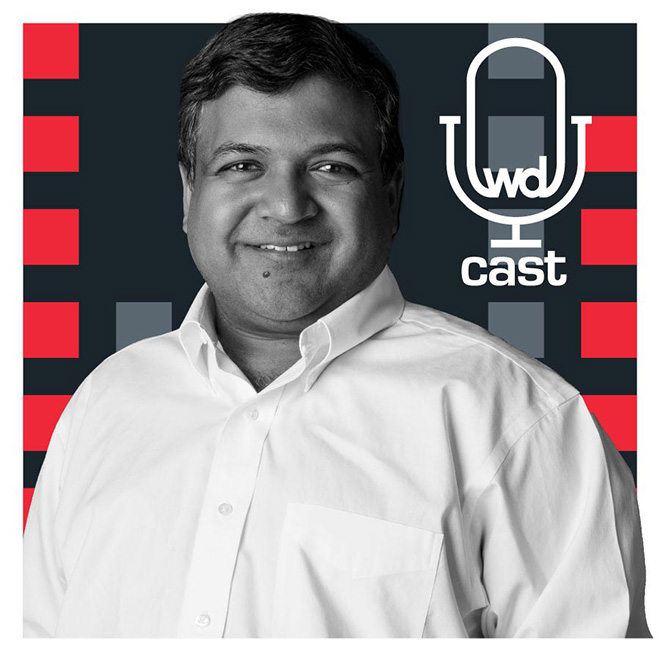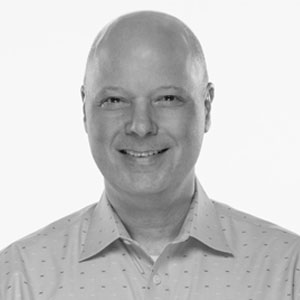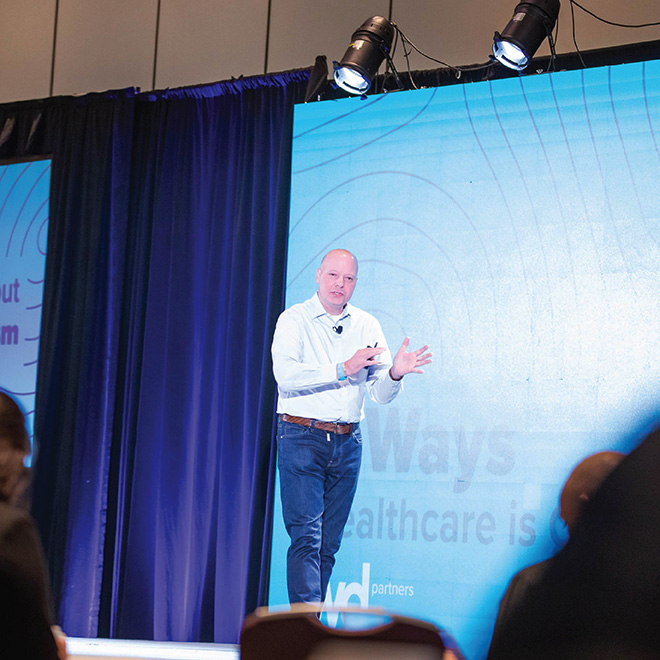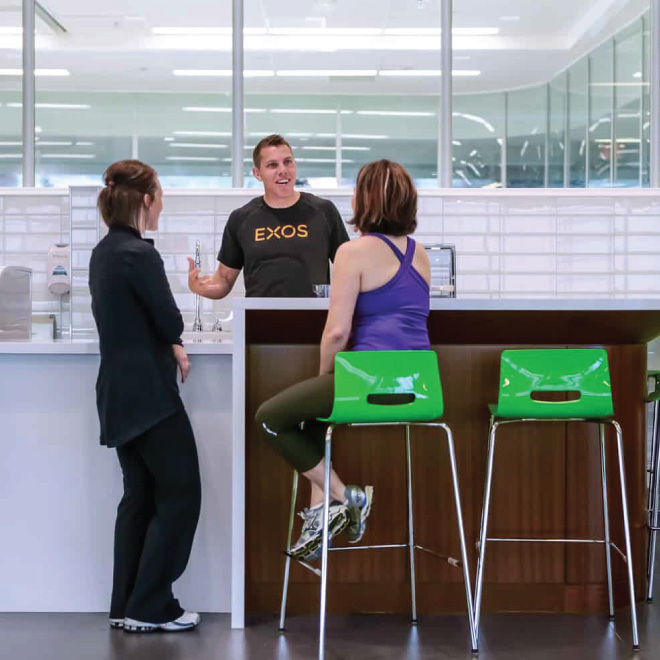
Restoring Humanity to Healthcare
A Conversation with the CEO of Iora Health
Estimated Read Time: 5 - 6 Minutes
Cramming in patients, barely having time to eat lunch, spending hours at the end of the day writing notes from visits, and so many billing codes. This is not why Rushika Fernandopulle became a doctor. Rushika became a doctor because he wanted to help people and he realized he couldn’t do that given the current healthcare system.
In a recent special episode, WD Partners’ Dan Stanek takes over as host of WDCast and sits down with the founder and CEO of Iora Health – Dr. Rushika Fernandopulle. They discuss what’s broken in the US healthcare system, how Iora Health is attempting to fix it, and what it means to be a human-centered healthcare organization. You can listen to (or watch) the full episode here, but in the meantime enjoy this excerpt of their conversation below.
The interview has been edited for length and context.
Dan Stanek, EVP at WD Partners:
It’s one thing to say, “Hey, I’m gonna change the system.” It’s another thing to do it. How did you actually pull that off?Rushika Fernandopulle, Founder & CEO of Iora Health:
So, the core premise was that what we needed to do was big change, not little change. What I realized is, maybe the system is rotten to the core, and maybe what we need to do is simply rethink it. Build a vision of where we’re going and not necessarily start with what we have.One of my favorite quotes is from the Cheshire Cat, and he said, “if you don’t know where you’re going, all roads will lead you there”. I happened to be lucky enough at the time to be running this inter-faculty Health Policy Program at Harvard. So, on their dime I was able to say, what could I do if I was going to start over and build a new model. I went around the country and learned from people who are doing interesting things and called people together for some interesting brainstorming. Asking what if you didn’t have constraints?
One of the premises for rebuilding healthcare, was instead of starting top down with the health system, what if you were to go bottom up and start with the consumer or the patient or the person and build up from there. Let’s start there and redesign primary care to help people. I went around to all the big health systems of the town here in Boston and said, I’ve been doing this work at Harvard and coming up with this completely different model of primary care, will you let me build it? And they all sort of patted me on the head. So that’s when I decided everyone has to be a little entrepreneurial and you just have to take the leap. It started as a single practice called Renaissance Health, the rebirth of primary care. We said, we’re just going to start over and break what people think are rules and figure this stuff out.

DS:
So not everybody is going to be familiar with Iora Health. Tell us what it is and what makes it different from the rest of healthcare?RF:
Our tagline is restoring humanity to healthcare. Right at the core, the problem with the current US healthcare system is that it is transactional. We’ve squeezed all the humanity out of it, it’s all checkboxes and rules. The burden is chronic disease, and we need to build a new relationship-based model of care. We have about 50 practices around the country right now that are actually doing this and not just talking about it. This is our theory of change; the vision and the reason we do this is to transform healthcare. And our theory of change is what I call the Southwest Airlines theory of change. Think of U.S. Airlines in 1980…high fares, crappy service. You know, what changed wasn’t consultants, or the government or Delta waking up one day and deciding to be better. It was a new entrant coming in doing something completely different and giving customers a better experience forcing others to change before they lose business. And that’s what we’re trying to do–change the whole industry.

DS:
What do your patients feel is different? What’s different to them about the experience?RF:
If you want to separate what it is we’re doing, it’s these things: consumer centric, digital and value based. So, the first is there’s this myth that the doctor will improve your health. What we’ve got to do as the healthcare system is say that you the patient and your family and loved ones are going to manage your health and what we need to give you the tools to do so. We need completely different philosophies to engage you and give you a great experience so that you will do so. We have to really leverage the digital tools out there. It is ridiculous in 2021 we are making people come in to get their lab results and we’re using faxes for goodness sake. In US healthcare, we get paid through what’s called ‘fee for service’ where you’re paid per doctor sick visit and these inane billing codes. So not only am I not incented to make you healthy, but I’m also actually disincentivized to make you healthy under the current payment model. That’s why we say we need to completely change the payment model. That’s what we do, really, is change everything. The payment, the process, the space design, so that it’s all aligned around this new vision of care.DS:
As you know, WD is focused on creating consumer centric experiences like we do for our retail and food service clients, who people go to in order to have great experiences. And we want to bring some of that human centered nature to healthcare. Do you feel that healthcare is so reluctant to adapt these kinds of human centered principles?RF:
I think it’s probably three things. I think one is the payment model we discussed–you get paid for doing more stuff to people. Number two is just deep culture…there is this hierarchical culture, this power dynamic that goes on in healthcare, the doctor is in charge. For instance, the fact that we have waiting rooms means that we value the doctor’s time, we don’t value the customers time, right? Finally, I think it’s an utter failure of leadership in healthcare. Right, we all took an oath to serve our patients, and we seem to have forgotten that in general. I think it’s slowly changing. This is becoming a more competitive market and customers and patients will start voting with their feet.DS:
Now, your patients, the people who are using your service, are also using other health services. So how do you accept accountability if they might go to an acute setting and something happens there?RF:
We think primary care is this amazing lever. We can do the usual primary care stuff…see people for acute problems, manage their chronic disease, maybe more importantly, we can help them with what I call the upstream. The things that influence health are things like how you eat, how you move, your relationships, how you sleep. Those things have a far bigger impact on your health than anything we do in the medical system. We can be your advocate and help you navigate the system.Let’s invest more in primary care, do it right, improve people’s health, keep them out of the hospital, and lower healthcare costs.
Interested in what else Rushika has to say?
Learn more about how WD can help innovate and scale your practice and then talk with our Health and Wellness practice leader, Dan Stanek, to get started.
 Dan Stanek
Dan Stanek


